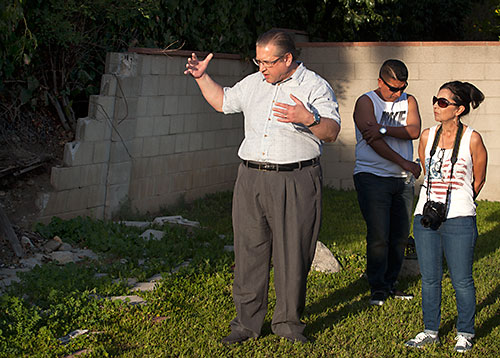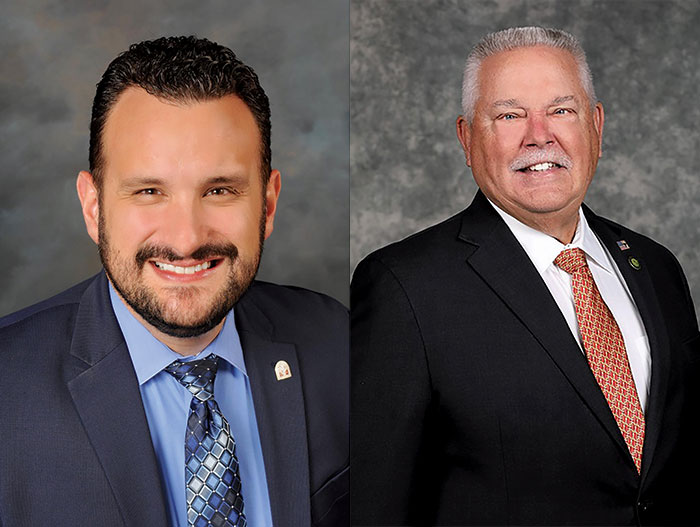City of Pomona regroups after complaints about hotel plan

A proposed three-story hotel in north Pomona is experiencing a furious pushback from neighboring residents.
Many of the residents live on Richbrook Drive, which is one block south of the proposed hotel’s location on Foothill Boulevard between the Pet Hotel (formerly Coates Cyclery) and a vacant building that used to be Friar Tuck’s. They are citing crime concerns, environmental issues and a lack of communication on repairing dividing walls between residential properties and the hotel site.
Rosie Hernandez is leading the neighbor group opposing the hotel. She said the current hotel situation on Foothill has contributed to an escalation of crime, and is concerned the upcoming hotel may make it worse.
“The crime has escalated, the homelessness has escalated, the drugs,” she said, adding that traffic has increased, and criminals routinely jump into her backyard when running from the police.
The saga began in February, when residents on Richbrook received notice of a Pomona planning commission meeting that would discuss the hotel later that month. The hotel project is part of the Pomona Corridor Specific Plan, and is rumored to be higher-end Hilton brand, according to reports.
For Ms. Hernandez, that notice was the first time she had heard about the project. She gathered a group of nine neighbors to go to the meeting to voice their 
“They were not prepared for us,” Ms. Hernandez said.
The city then postponed the discussion about the hotel to April 11.
Richbrook Drive lies within an unincorporated area of Claremont. While the street is on county land, Ms. Hernandez has a Claremont mailing address. The land directly north of the neighborhood, where the future hotel site is located, is in Pomona.
The existing motels, businesses and trailer parks along Foothill west of Claremont leave a lot to be desired. But the specific plan, which was adopted in 2014, aims to beautify multiple major corridors in Pomona, including Foothill Boulevard.
Still, Ms. Hernandez isn’t convinced the new hotel is going to help, based on her experiences with the current motels along the thoroughfare.
“It’s an ongoing problem, it’s only going to get worse as the hotel goes up. What kind of clientele are they expecting?” she asked. “How are they going to maintain it with the different walks of life that are present?”
Ms. Hernandez noted she talked to the city about the reason why they wanted to build a hotel, and they told her it was to accommodate Fairplex guests.
“Nobody on Foothill has ever utilized any of the existing inns and motels for that purpose,” she said.
The Richbrook residents received support from neighborhood watch group Keeping the Good in our Neighborhood (KGNH), which posted about the issue on their Facebook page. Multiple commenters on the page accused Claremont of moving homeless people into north Pomona, exacerbating the problem in that corridor.
In addition to crime, Ms. Hernandez claimed dividing walls separating properties from the lot have crumbled. The problems began in 2009, when the land was initially cleared, and continued into 2017 when the parcel was used to store construction vehicles during a sewer project.
“They used the parcel as a city yard so they can do all the piping and the tunnels for Foothill Boulevard, and it shifted the land again,” she said.
She believes Pomona is responsible for repairing her neighbors’ crumbled walls.
Ms. Hernandez invited city officials, including Pomona councilmember Robert Torres, to tour the backyards to see the damage up close on Monday evening.
About 30 residents attended the walkthrough, and included city planning officials Ata Khan and Emily Stadnicki, as well as architect Richard Chan of KU and Associates, the developer behind the hotel project. Claremont city councilmember Joe Lyons and assistant planner Leticia Cardoso were also at the tour.
The first backyard belonged to David Stolarz and his wife, Jan Parratt. The center of the wall had crumbled into the yard, and Mr. Stolarz said it happened during a rainstorm in 2017. Mr. Chan claimed the wall was within Mr. Stolarz and Ms. Parratt’s property, but Mr. Stolarz said it was Pomona land that shifted into his yard.
“Regardless of who it belongs to, it doesn’t matter,” Ms. Hernandez said. “It was a collapsed wall from your land.”
The next-door neighbor, Jose Gallegos, repaired his own wall when it crumbled, but cracks have begun to show. Another neighbor, Frank Ibarra, has a portion of his wall leaning into his property.
The conversation inevitably turned from the backyard walls to the hotel project itself. While Ms. Stadnicki urged the group to save the comments about the hotel for the upcoming planning commission meeting, it did not stop residents from voicing their concerns.
Richbrook resident Janice Printy said the three-story hotel would “wipe out the views of the mountains,” a feature that led her to buy her house 44 years ago.
Mr. Chan spent the evening defending the project. He noted that, at 36 feet high, the hotel was “not going to block out very much” in terms of mountain views. He assured residents that the hotel would be a positive addition to the community and not a “slum.”
Mr. Khan told the residents that city codes mandate a 60-foot setback from the property line to the hotel. He also noted the property still needs to go through a geological and soils report.
Pomona Councilman Mr. Torres lauded the walkthrough as “a good step forward” and said the city would have to study liability in terms of who is responsible for the crumbling walls. Geological experts would have to study the land for any ground shifts, he added.
A day after the tour, Pomona canceled the April 11 meeting that would have discussed the proposed hotel. An email sent out by Mr. Khan said city staff canceled the meeting after assessing community input and conferring with other departments.
“The Planning Division will conduct an initial study to better understand any necessary mitigations required for this project,” the email read. The environmental assessment will take 10 weeks, with a 30-day public noticing period.
—Matthew Bramlett
news@claremont-courier.com









0 Comments